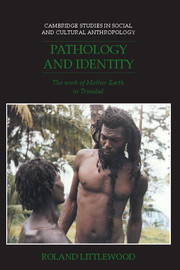Book contents
- Frontmatter
- Contents
- List of illustrations
- Preface
- Acknowledgements
- A note on idiom
- 1 The coming of the Earth People
- 2 A certain degree of instability
- 3 Madness, vice and tabanka: popular knowledge of psychopathology in Trinidad
- 4 Mother Earth and the psychiatrists
- 5 Putting Out The Life
- 6 Your ancestor is you: Africa in a new world
- 7 Nature and the millennium
- 8 Incest: the naked earth
- 9 The Beginning Of The End: everyday life in the valley
- 10 Genesis of meaning, limits of mimesis
- APPENDICES
- Glossary
- Notes
- List of references
- Index
- Cambridge Studies in Social and Cultural Anthropology
7 - Nature and the millennium
Published online by Cambridge University Press: 11 March 2010
- Frontmatter
- Contents
- List of illustrations
- Preface
- Acknowledgements
- A note on idiom
- 1 The coming of the Earth People
- 2 A certain degree of instability
- 3 Madness, vice and tabanka: popular knowledge of psychopathology in Trinidad
- 4 Mother Earth and the psychiatrists
- 5 Putting Out The Life
- 6 Your ancestor is you: Africa in a new world
- 7 Nature and the millennium
- 8 Incest: the naked earth
- 9 The Beginning Of The End: everyday life in the valley
- 10 Genesis of meaning, limits of mimesis
- APPENDICES
- Glossary
- Notes
- List of references
- Index
- Cambridge Studies in Social and Cultural Anthropology
Summary
The fragmentary strands of countertradition – Lamartine's ‘premature truths’ – may at certain poignant political moments become central, their oppositional themes affirmed and reworked into a putative new social order; not just by willed revolutionary consciousness (though this may well be the experienced reality) but because of perceived changes in the social and technological conditions in which the dominant and the subdominant are held in opposition – in a loss of coercive power among certain sectors, through scandals among the dominant or other discreditings of its own rationale, by rumours of emancipation, or through more widespread changes which argue a more general frame.
The return to the past; the rejection of industrial technology; the identification of the Blacks as the chosen people; the White appropriation of the Bible; Christianity as colonial apologetics; these motifs are common to numerous movements which have developed among the peoples colonised or enslaved by Europeans: cognitive schemata as social action which momentarily looked to a day of deliverance, to the destruction of the colonial order, and the restoration of traditional liberty. These movements, sometimes building upon existing pre-colonial ‘apocalyptic’ themes of redemption and transcendence, have acted as the justification for military struggles, or else, faced with overwhelming White power, have become ‘individualised’ and quietist, ultimately coming to resemble contemporary Western religious sects.
Such movements may provide an initial explanation of defeat simply as a consequence of superior technology, while later explanations argue that the people were once divinely chosen but that, through sin or error, this privilege has been revoked.
- Type
- Chapter
- Information
- Pathology and IdentityThe Work of Mother Earth in Trinidad, pp. 112 - 135Publisher: Cambridge University PressPrint publication year: 1993

